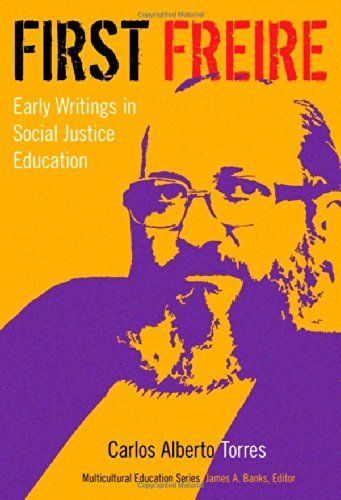
First Freire Early Writings in Social Justice Education
In his new book, Carlos Alberto Torres, an internationally renowned critical theorist of education, explores the early writings of Paulo Freire whose ideas have had a tremendous and long-lasting impact on the world of pedagogy and politics. Torres analyzes Freire’s works, from the 1960s and 1970s, before Freire gained worldwide recognition for his Pedagogy of the Oppressed. Offering an in-depth look into the formative thinking of Freire, Torres identifies how his ideas produced frameworks for educating global citizens, building community and mutual respect, creating social responsibility, instilling an appreciation for diversity, promoting multiple literacies, and social justice education. This volume is the result of more than 3 decades of research with access to Freire’s personal library and the archives of the Paulo Freire Institute, as well as the author’s extensive conversations with Paulo Freire over two decades—Dr. Torres was Freire’s adviser during his tenure as Secretary of Education in the Municipality of São Paulo, Brazil, 1989–1991. “First Freire is a fascinating discourse on the meaning and power of Freire's contribution by a noted colleague and scholar.” —Henry M. Levin, William Heard Kilpatrick Professor of Economics and Education, Teachers College, Columbia University “Paulo Freire was one of the great educational and political philosophers of the 20th century. In First Freire, Torres—a foremost Freire scholar—has provided us with a wonderful and insightful analysis of the many facets of Freire's writings. Particularly important is Torres’ ability to situate Freire's work in the political context that framed and defined his writings. Hopefully, First Freire will inspire a new generation of educators to move beyond the current neo-liberal discussions about student test scores and ‘what works’ to understand the political meaning of education.” —Martin Carnoy, Vida Jacks Professor of Education, Stanford University “Professor Torres successfully combines, in unconventional ways, his personal reminiscences of Freire with essays that illuminate Freire’s political philosophy and thoughts on the anthropology of education, demonstrating specific approaches one can use to engage in the method of thematic investigation proposed by Freire. A considerable merit of this book is how it persuasively shows the timely relevance of the critical observations of this great Latin American thinker to contemporary society, as we struggle to go beyond economic and technological globalization to rebuild our changed but still community-oriented selves.” —Nelly P. Stromquist, professor, University of Maryland